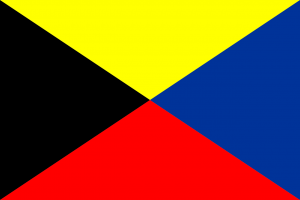Difference between revisions of "Language/Zulu"
| Line 19: | Line 19: | ||
Zulu is a Southern Bantu language of the Nguni branch spoken in Southern Africa. It is the language of the Zulu people, with about 12 million native speakers, who primarily inhabit the province of KwaZulu-Natal of South Africa. Zulu is the most widely spoken home language in South Africa (24% of the population), and it is understood by over 50% of its population. It became one of South Africa's 11 official languages in 1994. | Zulu is a Southern Bantu language of the Nguni branch spoken in Southern Africa. It is the language of the Zulu people, with about 12 million native speakers, who primarily inhabit the province of KwaZulu-Natal of South Africa. Zulu is the most widely spoken home language in South Africa (24% of the population), and it is understood by over 50% of its population. It became one of South Africa's 11 official languages in 1994. | ||
Zulu, known by native speakers as IsiZulu, is one of the 11 official languages of South Africa. It is a member of the Nguni language group (other Nguni languages are Xhosa, Swati and Ndebele). These languages are spoken by more than 20 million people. Despite the proliferation of languages in South Africa, Zulu remains the language with the largest number of speakers. It is spoken by approximately 8.3 million people in South Africa, as well as by populations in Malawi, southern Swaziland and Lesotho. In KwaZuluNatal, which is the largest province in South Africa, Zulu is the dominant language. Zulu is also the most commonly spoken language in the southeastern parts of Mpumalanga and Gauteng provinces, as well as in the northeastern part of the Orange Free State. | |||
Zulus live in both rural and urban areas of southern Africa. Every year, they hold ceremonies, including Heritage Day and the Reed Dance Festival, that keep their culture and traditions vibrant and alive. One of the most distinguishing features of the Zulu people is their beadwork, which is known throughout the world for its beauty and intricacy. The beadwork encompasses a symbolic language that may include reprimands and warnings, messages of love and encouragement. | |||
Another important facet of traditional Zulu culture is the belief in sangomas, the divine healers of the Zulu people. Sangomas are thought to have supernatural powers of communicating with the ancestral spirits on behalf of the people. This and other traditional beliefs continue to play a significant role in the lives of many Zulus. | |||
===Sources=== | ===Sources=== | ||
https://en.wikipedia.org/wiki/Zulu_language | *https://en.wikipedia.org/wiki/Zulu_language | ||
*https://nalrc.indiana.edu/doc/brochures/zulu.pdf | |||
==Zulu Dictionaries== | ==Zulu Dictionaries== | ||
Revision as of 17:31, 3 October 2021
Hi Polyglots! 😃
Welcome to the Zulu learning page!
You will find below many free resources to learn and practice this language.
Enjoy your learning journey with Polyglot Club! 😊
Facts about Zulu
- Language code (ISO 639-3):
zul - Autonyms (how to write "Zulu" in Zulu):
IsiZulu - Other names for "Zulu":
Isizulu, Kingoni, Ngoni, Zunda - The Zulu language is spoken in:
South Africa
Zulu is a Southern Bantu language of the Nguni branch spoken in Southern Africa. It is the language of the Zulu people, with about 12 million native speakers, who primarily inhabit the province of KwaZulu-Natal of South Africa. Zulu is the most widely spoken home language in South Africa (24% of the population), and it is understood by over 50% of its population. It became one of South Africa's 11 official languages in 1994.
Zulu, known by native speakers as IsiZulu, is one of the 11 official languages of South Africa. It is a member of the Nguni language group (other Nguni languages are Xhosa, Swati and Ndebele). These languages are spoken by more than 20 million people. Despite the proliferation of languages in South Africa, Zulu remains the language with the largest number of speakers. It is spoken by approximately 8.3 million people in South Africa, as well as by populations in Malawi, southern Swaziland and Lesotho. In KwaZuluNatal, which is the largest province in South Africa, Zulu is the dominant language. Zulu is also the most commonly spoken language in the southeastern parts of Mpumalanga and Gauteng provinces, as well as in the northeastern part of the Orange Free State.
Zulus live in both rural and urban areas of southern Africa. Every year, they hold ceremonies, including Heritage Day and the Reed Dance Festival, that keep their culture and traditions vibrant and alive. One of the most distinguishing features of the Zulu people is their beadwork, which is known throughout the world for its beauty and intricacy. The beadwork encompasses a symbolic language that may include reprimands and warnings, messages of love and encouragement.
Another important facet of traditional Zulu culture is the belief in sangomas, the divine healers of the Zulu people. Sangomas are thought to have supernatural powers of communicating with the ancestral spirits on behalf of the people. This and other traditional beliefs continue to play a significant role in the lives of many Zulus.
Sources
Zulu Dictionaries
• Isizulu.net: Zulu-English dictionary
• Useful Zulu medical dictionary by Jason Wolfe (1993)
• Unisa: Zulu-English vocabulary by topics & common phrases (+ audio)
• Zulu-English dictionary by Clement Doke & Benedict Vilakazi (1972) [[new.htm|[[File:../images/newlink.gif|class=img-0|what's new?]]]]
• Zulu-English dictionary & synopsis of Zulu grammar & concise history of the Zulu people from the most ancient times, by Alfred Bryant (1905)
• Zulu-English dictionary by John Colenso (1905) & 1861 edition
• English-Zulu dictionary by Charles Roberts (1895)
• Metaphor in Zulu: problems in the translation of Biblical metaphor in the Book of Amos, by Eric Hermanson (2006)
Sources
https://www.lexilogos.com/english/zulu_dictionary.htm

